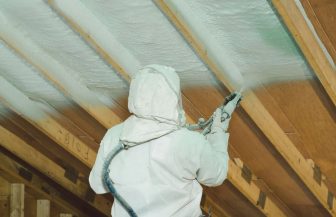 Mortgage lenders are continuing to refuse to lend against properties that have a certain type of spray foam insulation in place, leaving homeowners unable to sell.
Mortgage lenders are continuing to refuse to lend against properties that have a certain type of spray foam insulation in place, leaving homeowners unable to sell.
Fresh research carried out by the BBC shows that a quarter of the UK’s biggest mortgage providers will not lend against homes with spray foam in the roof.
It is estimated as many as 250,000 homes in the UK have this type of insulation, with much of it installed under the previous government’s Green Homes Grant scheme.
“We were blissfully unaware of any issues to do with it until we put the house on the market,” said Wendy Rowe, whose family struggled to sell her late father’s home and paid thousands to have the insulation removed.
Some mortgage firms are reluctant to deal with homes with spray foam insulation due to concerns over poor fitting leaving moisture trapped and roof timbers at risk of decay.
However, the Insulation Manufacturers Association insists that spray foam can be beneficial if properly installed.
Spray foam insulation has been used to stop heat escaping from roofs, lofts and attics for decades and comes in two forms.
Closed cell spray foam is rigid once set. It is a better thermal insulator and was previously sold to stabilise failing roofs. But if it has been used inappropriately or installed poorly, it might put stress on timbers, restrict air circulation and put them at risk of decaying.
Open cell spray foam remains soft once set and is only used for insulation. It is more breathable but is often installed where a highly-resistant underlay like bitumen felt is already present, stopping vapour from escaping.
While a recent report by the Health and Safety Executive highlighted situations where using open cell was low-risk, it cautioned against applying it directly to roof tiles.
The BBC says that the nature of spray foam can make it tricky for valuers acting on behalf of lenders to inspect the condition of roof timbers.
When the BBC contacted the 20 largest lenders in the UK, five of them, TSB Bank, Skipton Building Society, Co-operative Bank, Principality and equity release lender Aviva – said they did not lend against properties where spray foam is found in the roof space.
The Yorkshire Building Society and Metro Bank said they would not usually lend where there is a significant amount of spray foam.
Equity release provider More 2 Life told the BBC it will only lend on properties with spray foam where it was fitted as part of an authorised new build and has the necessary documentation.
Other lenders such as Lloyds, Nationwide, Barclays, the NatWest Group and Santander have said they consider applications on a case-by-case basis, and will take a valuer’s report into account.
They may, however, ask homeowners for documentation showing it has been installed correctly or for a specialist report to be carried out.
In 2023, the PCA published an inspection protocol in a bid to help surveyors and lenders assess any potential risk in pitched roofs.
But many homeowners still feel as though they been left in limbo.


The Government ruining peoples lives.
You must be logged in to like or dislike this comments.
Click to login
Don't have an account? Click here to register
~75% of lenders lend on it just fine, and for those that don’t, removing it is hardly ruinous. The continuing lack of action on cladding, and the continuing failure to rein in service charge increases, are far bigger problems.
You must be logged in to like or dislike this comments.
Click to login
Don't have an account? Click here to register